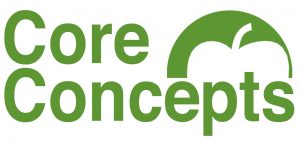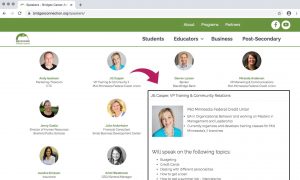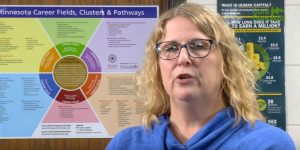New Career Activity Ideas
"Tell me and I forget, teach me and I may remember, involve me and I learn."
- Benjamin Franklin
Since many activities are being reduced or postponed due to the covid-19 pandemic, Bridges is showcasing new career experience activities that can be done in small groups or remotely and still have a positive impact on career exploration. These activity ideas are presented to compliment the existing classroom curriculum and may be used as extra projects or to replace an activity that can’t happen this school year (like a business tour).
Additional ideas will be added as they are shared, so if you have an activity you’d like included, contact Mary.
And, don’t forget about our Educator Resources, including Lesson Plans, videos and tons of other online resources designed to support a challenging school environment.
Click the "+" on the right side of each category bar below to view these new career activity ideas.

 Many professionals who are a part of the Bridges Speakers Bureau program are available to participate with your class virtually. Most have used Skype, Zoom or GoToMeeting, but can certainly be introduced to GoogleMeet or other e-conferencing software.
Many professionals who are a part of the Bridges Speakers Bureau program are available to participate with your class virtually. Most have used Skype, Zoom or GoToMeeting, but can certainly be introduced to GoogleMeet or other e-conferencing software.
Visit our Speakers Bureau to select a speaker and view their range of topics, then email them to find the best method to reach your class.
How to Use Video Conferencing Services
- Skype.com (does require downloading software)
- Zoom.com (does require downloading software)
- GoToMeeting.com (does require downloading software)
- GoogleMeet (browser-based, so nothing to download)
If your school doesn't have a video conferencing subscription, the speaker you choose may be able to facilitate (host) the meeting and just send you a link to deliver to your students.
Best Practices (tips!) for Video Conferencing with a Speaker
- Log into the software before the scheduled speaker time to test your connection and the software
- If you are the meeting host, give the speaker the ability to "share" their screen
- Let the students know how they should ask questions — using the raised hand gesture, written/chat functionality or switching their video on
- Ask the students to mute when they are not speaking
- If using video, choose a basic background like a wall (not a window)
- If you will be recording the presentation to allow students to watch it at a later date, notify the speaker ahead of time
Video Tours of businesses are included by subject area in the "Distance Learning" section of the Teacher Resource page, and also shown below. Check back frequently as new videos will be added often.
Manufacturing
Agriculture/Food/Natural Resources
- Canadian Farm & Food Virtual Tours (video with 360 views)
- Nat'l Ag in the Classroom Virtual Tours
- American Dairy Assoc Virtual Tour
- MN State Parks (360 photo tours)
Transportation
A Work-Based Learning or Capstone Project is something that showcases the culmination of what a student has learned. Central themes of these projects include:
- a portfolio of the student’s best work
- research around a preferred topic with a final document presenting what was learned
- showcase a community service project or learning activity
- presentation of an engagement/job in a real-world activity
Ideas for Projects
Work-Based Learning
- Part-time work (ie: restaurant)
- Develop a product (laser engraving, welding, woodworking, etc.)
- Hands-on volunteer work (ie: forest management with MN DNR)
- Livestock and animal management
Capstone Projects
- Develop a detailed plan for small business
- Produce a newspaper, magazine or website
- Design/build a baked good (gingerbread house, full meal, 2-layer cake, etc)
- Develop a personal finance plan
- Present and demonstrate skills with office software (spreadsheets, word possessing, etc)
- Create a marketing plan for a new sports franchise
- Create a resume and conduct mock interviews
- Present a gallery of artwork
- Investigate a mock crime scene and demonstrate skills learned
- Conduct a student survey based on how weather affects emotion
- Create and produce an ‘Anti Bullying’ campaign
- Develop and conduct a student survey comparing ‘Traditional Education Versus E-Learning
- Create a photo documentary and use it to create a series of short media videos
- Video tape and publish family members’ stories focusing on older generations first
- Develop an interactive family tree with voice-overs from living family members
- Design a ‘Tiny House’ that you will live in after graduation
- Create a animation video using the school logo/mascot
- Design and build a hydroponic garden
- Research report/writing ideas
Research & Resources
- Article: Can 'Capstone Projects' Deepen Learning for High School Seniors? (Education Week)
- Best Practices in Capstone Projects (research paper) – PDF
- Sample Student Guide to a Capstone Project (Fall Creek HS) – PDF
- MN Dept of Ed — CTE Work-Based Learning
- Assoc of Career & Technical Education (ACTE) — Work-based Learning Guides, Toolkits and Standards
Service-Learning, volunteering and Community service projects apply content knowledge, critical thinking and good judgment to address genuine community needs. Service learning is a way of teaching and learning that engages all learners in hands-on projects in the community to meet learning objectives and mutually benefit both the student as well as strengthen communities.
Typically these activities involve going to a physical location or face-to-face contact, but here are a few activities that can be done remotely:
- Help younger students in your school district
- Tutor or teach lessons to students with needs
- Becoming an online advisor for an elementary or middle school student
- Volunteer to mentoring elementary students
- Create Zoom games such as Freeze Dance, Story Chain, I Spy or Mystery Bag for elementary teachers
- Read online to elementary schools
- Interview elder community members to compile a biography
- Research the history of a local site such as community park. Create and install informational signage about the site
- Landscape (or help maintain) a local park
- Develop maps for local areas that lead to specific trees, plants or other vegetation
- Work with DNR to remove trash or invasive species from lakes or rivers
- Produce newsletters for a community center to inform citizens about local activities
- Sponsor a Service Learning Craft Club, conduct demonstrations or use projects for fundraising
- Create video or audio podcasts on school and community issues such as bulling or recycling
- Start a gardening project teaming higher and lower grades
- Hold an auction for a local charity or organization
- Participate in a ‘Global Memory' project
- Creating a marketing strategy for a public health issue
- Volunteer to make signs for a community forum
- Adopt a highway
- Community beautification projects
- Do grocery shopping for the elderly
- Provide a meal for needy individual
- Hold a book drive
- Start a student ‘Clothes Closet”
Here are some additional project ideas by interest areas.
Art
- Develop an art program at the local senior center, children’s hospital, or domestic violence shelter.
- Create an art program consisting of mini-lectures and hands-on activities and implement in K-12 classrooms.
Social Studies
- Create an anti-bullying materials or hold a workshop appropriate elementary, middle or high school students.
- Work on child abuse issues (Child Abuse Prevention Month – April) by developing an informational brochures, posters or videos.
- Raise awareness for the prevention of human trafficking through an event/informational workshop open to the public.
Business
- Create a project in which Business students provide tax preparation assistance to the community.
- Work with local businesses, accountants and banks to put on student workshops on household finances, budgeting and credit.
Computer Science
- Teach students or community members on how to create a website, a PowerPoint presentation, or an animated video.
Culinary Arts
- Conduct a workshop for students or families on creating a low-cost, healthy meals from canned food and boxed food items from the food shelf.
- Volunteer to cook or server at nonprofit events.
Physical Education
- Start an after-school dance program for teens.
- Organize a dance event/fundraiser for local charity. Conduct dance lessons prior to event.
- Create a healthy dance/chair exercise program for the elderly in a local nursing home.
Education
- Organize a ‘study buddy’’ program.
- Plan and implement a play and recreation environments for kids during summer.
English
- Become writing partners or tutors with residents at local homeless or domestic violence shelters. Assist residents with resume-writing and filling out job applications.
- Develop and implement a tutoring program for local elementary school students.
Math
- Create an after-school tutoring program for elementary school students.
Marketing/Video Production/Computer Science
- Create and produce informational videos for non-profit agencies.
Psychology
- Volunteer at local hotline services.
Political Science
- Assist voter registration efforts.
- Work with senior citizens groups to lobby for legislation to meet the needs of senior citizens.
Sciences
- Create and maintain a community garden
- Conduct workshops at elderly resident homes on "What’s Happening to My Body?” highlighting particular nutritional needs of the elderly and physical changes they are going through.
- Create workshops for students on "greening" their rooms, homes, apartments. Installation of low-flow water heads, composting, strategic planting trees, etc.
- Host an Environmental Awareness Fair open to the public.
“Uhm, Like, I Mean, You Know” are the MOST common “filler” words most students use when they are interviewing unprepared. With a little practice, they can eliminate those annoying “filler words.”
What is Interviewstream?
Interviewstream is a mock virtual/video interviewing program that helps your students prepare for an interview. Students learn to strengthen their verbal and nonverbal communication skills, as well as strengthen other “self-skills,” such as confidence and goal setting.
Why use Interviewstream?
Your students wouldn’t walk into a test without preparing. Why let them interview that way? Students often do not have the soft skills necessary to pitch themselves to employers and are nervous about the experience or get stumped by unfamiliar questions. Practicing these essential skills will give students the knowledge and confidence to land a job with ease.
Who can use Interviewstream?
Bridges students, Bridges teachers, HS counselors and career advisors can all use it for FREE! If you are interested in setting up an educator account, email Betsy and she will register you as a Professor in the program. Students can register here, and find more resources related to preparing for an interview.
Additional Resources on Interviewing
An informational interview is an informal conversation a student has with someone working in their area of interest. It's a great way to engage students into researching about careers and businesses, but it's important to remind them that an informational interview is NOT a job interview, and the objective is not to find job openings.
Students will feel awkward reaching out to people they don't know. Making sure they are prepared is the first step in easing this feeling. Assure students that most professionals actually enjoy taking a few moments out of their day to reflect on their professional life and give advice to someone with an interest in their field.
Benefits of Informational Interviewing
- Get firsthand, relevant information about the realities of working within a particular field, industry or position.
- Find out about career paths you did not know existed.
- Get tips and insider knowledge about how to prepare for and land your first career position.
- Learn what it’s like to work at a specific organization.
- Initiate a professional relationship and expand your network of contacts in a specific career field; meet people who may forward job leads to you in the future.
Steps of Informational Interviewing
- Research career fields
- Identify professionals to contact
- Prepare for the interview
- Write an introduction about yourself and practice reading it out loud
- Develop questions to ask (see below)
- Initiate Contact
- only ask for 15-20 minutes
- Reiterate that you are looking for information, not a job
- Conduct the Interview (face-to-face, over the phone or via video conferencing)
- Share your background (your introduction)
- Ask one of your prepared questions, but also let the conversation flow naturally, and encourage the professional to do most of the talking
- Ask the professional if you may contact them again in the future with other questions
- Ask for referrals — names of other people to meet so as to gain different perspectives
- Follow Up
- Try to take notes during the interview or immediately after
- Send a thank you note within 1-2 days thanking the professional for their time
Interviewing Tips & Great Questions to Ask
- CAREERwise (Minnesota State) Informational Interview Tips
- CareerOneStop (US Dept of Labor) Tips
- UM Career Center
- MN State Mankato Career Center
- UC Berkley Career Center

Click to watch how Pine River - Backus instructor Nicole Bergmann has successfully used e-mentoring in her classroom.
A Student Mentoring Programs is a career activity designed to build relationships and teach networking, composition and communication skills. Students are matched with industry professionals (mentors) who act as positive role models and help students with their career exploration and understanding. Students (mentee) are usually prompted with relevant questions from their instructor to start the dialogue.
- Traditional Mentoring — professionals and students meet face-to-face, to have a dialog about careers and work-place readiness. Interactions are in a controlled environment (such as your high school)
- E-Mentoring — communication occurs digitally, typically through email, but could also be conducted through a message board or via text. Students learn how to exchange professional emails that are both personal and appropriate, all while making a vital connection with a professional.
Both of these methods of mentoring allow students to gain knowledge about real world careers and businesses.
Student mentoring is a great career experience for any student, at any grade. Mentoring can even involve a relationship with someone who's further along in their career field, like a college student. Mentors can help guide students with career decisions, offer insight about an occupation, industry, or career. They can also offer guidance, support, and motivation. Mentoring relationships can range from very informal to completely formal.
Resources
- BestPrep.org — E-mentoring service that offers software to allow educators to review/preview messages to professional before they are sent
- MentorMN.org (MN affiliate) — organization that coordinates state-wide mentoring efforts
- National Mentoring Resource Center (research)
- Topics in Mentoring: Guides with content about specific populations of youth in mentoring, as well as specific mentoring program types
- Resources to Mentoring Programs: Collection of mentoring handbooks, curricula, manuals, and other resources that practitioners can use to implement and further develop program practices
- Measurement Guide Toolkit: A go-to resource of recommended instruments for measuring key youth outcomes in mentoring programs
- Research about School-based Mentoring
If you'd like support matching up a student with a local mentor, contact Mary.
Offering students activities outside of the classroom helps them develop teamwork experience, time management and leadership skills. They foster creative thinking and help round out a students’ portfolio.
Below are links to the most common nationally recognized career-based high school clubs. But, don’t be limited by this list! Consider developing a NEW club concept based on collective skills, interests or hobbies of your students.
National High School Clubs (and competitions)
- Business Professionals of America (business)
- DECA (marketing)
- Envirothon (environment)
- Future Business Leaders of America (business)
- Future Farmers of America (ag)
- Future Teachers of America (education)
- HOSA (health)
- Junior Reserve Officers Training Corps (JROTC)
- Key Club (community service/Kiwanis)
- MN Mathletes (Math)
- Mu Alpha Theta (Math)
- ProStart (culinary)
- Quill and Scroll (Journalism)
- Robotics (IT, engineering)
- SkillsUSA (technical careers)
- Solar Car (science & engineering)
- Technology Student Assoc (IT)
Other school-based activities that support career-readiness include:
- Debate
- Mock Trail
- Speech
- Student Government/Student Council
- Yearbook and/or Newspaper staff
A Student Career Portfolio is a purposeful collection of student work that exhibits effort, progress and achievement over time and against a set of clearly defined outcomes. Portfolios include collections of work that demonstrate evidence of:
- work in progress and accomplishment of projects
- showcase of knowledge or skills
- workforce readiness (i.e., skills in problem solving, adaptability or ability to collaborate)
- college readiness (i.e. applications, letters of recommendation, test scores)
Resources
- Sample Career Portfolio check list - PDF
- Template Student Portfolio guide – word doc
- Creating an online portfolio (Minnesota State CAREERwise)
- Work Samples and Portfolios (DEED)
- Creating Portfolios for Success (research)



